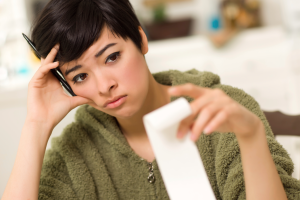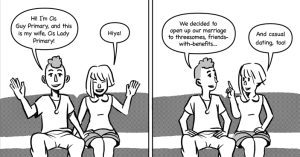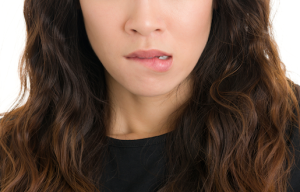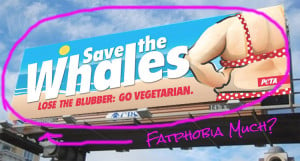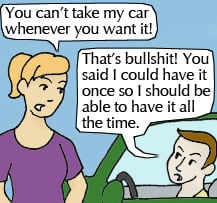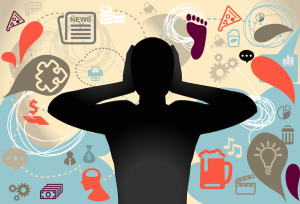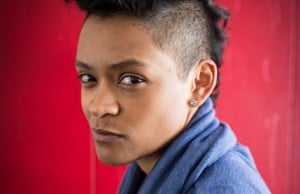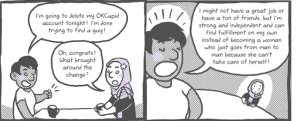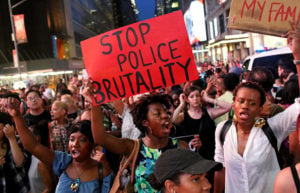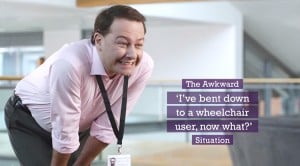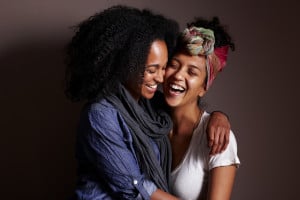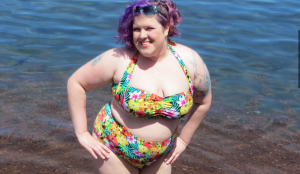Are you introverted or extroverted?
Do you like coffee or tea?
Are you a Democrat or a Republican?
We humans like to categorize. We automatically put people into one of two boxes, even though sometimes folks can be in both, in between, or somewhere else entirely.
“Two” is a pretty small number of options for how to identify. There are more than two kinds of food. There are way more than two sports people play. There are so many different colors.
Nature has a huge amount of variety. Can you imagine if we only recognized two types of trees? Say, oak and birch.
Then a pine tree comes along, and we’re all like, “Ummmm, nope. Pine trees don’t exist. You’re clearly an oak.”
The gender binary is just as limited. It recognizes only two genders, which erases everyone who doesn’t fit in as solely male or female.
Non-binary erasure is like pretending that pine trees don’t exist. But in actuality, we have been around since the beginning of time.
The world continuously erases our existence, keeping us from our deepest and most joyous selves.
When we internalize prejudice against non-binary people, we are denied access to our whole being.
We all need to be recognized as who we are. It’s a fundamental human need.
Different non-binary people have different experiences of non-binary erasure. After all, the truest generalization you can make about non-binary folks is that we are hugely diverse.
Of course, I can’t speak for all of us. I can tell you some of what I’ve noticed from my perspective as a white, assigned-female-at-birth non-binary person. And I’ll link to some folks who experience different intersecting oppressions from me.
Getting a Sense of the Numbers
Non-binary erasure has some pretty dire impacts.
We are more likely than a binary-identified trans person to:
- Try to kill ourselves (43% non-binary versus 41% binary trans);
- Be harassed by police (31% non-binary versus 21% binary);
- Earn less than $10,000/year (21% non-binary versus 14% binary trans);
- Be assaulted, physically (32% non-binary versus 25% binary) or sexually (15% non-binary versus 9% binary), due to gender bias.
Non-binary folks did have some statistical advantages in this survey (we are more likely to be out at work and less likely to be fired for it – though the rates of harassment, 90%, are the same). Across the board, statistics for trans folks, including non-binary people, are pretty horrifying.
The numbers are only higher for non-binary people of color (who, contrary to popular stereotypes, actually make up a disproportionate amount of non-binary folks).
We also happen to be some of the most creative, glittery, beautiful, and resilient people I have ever met.
Where do these disparities come from? Let’s unpack some examples of non-binary erasure to start figuring it out.
1. Language Often Excludes Us
When I came out, my aunt wanted to know what to call me. I wasn’t sure. Niecephew? Nephece? Child of her husband’s sister?
So many words in our language are unnecessarily gendered!
One difficult thing about being non-binary is that our language doesn’t hold us. It fails us at every turn. So many times, existing words just don’t fit.
That’s why many of us make our own words for ourselves.
Thinking back to the tree example, imagine if we tried to describe all trees only based on words for oak and birch trees. You might be able to get a vague approximation sometimes, but you wouldn’t get far.
Or if you tried to describe all colors only using words for different shades of pink and blue. Some colors which are close might be sloppily approximated, but others would just be left out.
Some of us never want to be associated with gendered words, while others have different preferences.
Self-determination is everyone’s right. It’s a linguistic right many non-binary people employ with the joy of finally fitting into ourselves.
2. People Rarely Perceive Our A/Genders Accurately
It’s not simple or monolithic (and the whole idea of passing is definitely rooted in cissexism). But some binary trans people, through a desire for safety or just because they want to, are automatically read as their actual gender at some point in their lives.
Non-binary people are not automatically read as ourselves.
For us, there is no possible endpoint where we can hope to be safe when being read as our true a/gender identity. For us, if we are open about our a/gender identity (not solely a trans status), we also continually face denial, invalidation, and violence.
We don’t fit into other people’s ideas of what binary gender is. But that doesn’t mean that our a/genders aren’t real, or that we don’t experience oppression.
Non-binary folks spend most days being misgendered constantly.
And then when we are correctly read as non-binary, it can be extremely dangerous (especially for non-binary people who are assigned male at birth and/or people of color).
This is because we often are only read as non-binary or trans or gender non-conforming by people who are hostile to us.
And the consequences of that can be deadly.
We need more people to recognize us in solidarity, not violence.
If more people affirmed us, being read as ourselves would be safer.
We would have the space to safely be who we are.
3. We Are Omitted from Studies and Legal Documentation
I understand why some folks are celebrating “marriage equality,” but I still don’t legally exist.
With rare exceptions, most governments don’t recognize our existence. In the United States, “male or female?” is everywhere – on forms and licenses, in doctors’ offices, and on birth certificates. There is no other legal option here.
We are excluded when people conduct research, too. Subjects are categorized as “men” or “women” (and assumed to be cisgender and dyadic, or non-intersex) without properly recognizing trans, intersex, and/or non-binary folks.
This means that most studies are inaccurate, ignoring a huge number of people who need accurate representation!
Often, the answer is “we don’t know” when it comes to a specific question about non-binary realities, or “you don’t legally exist.”
This causes direct harm. It affects everything from the impact medications might have on our bodies to the impact the wage gap has on non-binary and/or trans people.
4. People Tell Us What They Think Our Pronouns Should Be
Many people tell me that my pronouns are wrong, hard, ungrammatical, or silly. I’ve heard many folks say, “We could get behind non-binary pronouns if you all would just unify and pick one!” Even when some of us decide not to use pronouns at all, people’s feathers get ruffled.
But generally speaking, it’s rude to argue when someone introduces themself.
At least, it’s rude if our society has decided your name is acceptable. This is a privilege often reserved for white, cis people.
When non-binary people use pronouns other than he/him/his or she/her/hers, a lot of folks seem to think that means we just love correcting other people all the time.
Newsflash: This is false.
Just because our pronouns are not as common — similarly to names you may not be familiar with — doesn’t mean that you can use entirely different ones. All our pronouns (or our lack thereof) are valid!
5. Non-Binary People Are Perceived as Inherently Unprofessional
Go try to get a job after introducing yourself with “they/them” pronouns. Go ahead. I’ll wait.
The idea that we’re unprofessional simply by existing is rooted in the idea that our a/gender identities are less valid than binary people’s.
Imagine if someone told binary men or women that they couldn’t be women or men in the office, because that was unprofessional. Of course that sounds nonsensical — because people generally believe binary men and women exist.
People do tell trans men and women that coming to work as themselves is unprofessional. But that’s because of transphobia, not because of non-binary erasure. Nobody is telling them that men or women don’t exist — they are saying that only cisgender people are valid.
It’s a slight difference, and of course this causes huge problems as well — I’m highlighting how non-binary erasure creates another kind of invalidation.
The real problem is that people don’t think that we have a right to take up space as ourselves.
As Micah says over at Neutrois Nonsense:
“An important lesson I’ve learned being non-binary, or for anyone who transgresses gender norms, is that sometimes the ideal is often not within reach (yet…) and all the options left pretty much suck. Unfortunately, society only recognizes two genders, and it comes down to choosing the least worst option that makes your day-to-day less painful. …What you choose depends on who you are at that point in time, what will bring you closer to who you see yourself to be, and what will lead to a better life.”
6. People Don’t Think We Should Have Bathrooms
Oliver Renee Schminkey has great things to say about this: “Walking into a bathroom for me is like a one-person hide and go seek. No one is trying to find me, but I always still feel like I’m hiding.”
The epic search for a safe, gender-neutral bathroom is a continual reality of non-binary life.
If these bathrooms exist, they’re often far out of the way. This is not only inconvenient, time-wasting, and isolating – it is straight-up ableist, as not everyone can wander incessantly looking for a bathroom up a third flight of spiral staircases.
If we are lucky enough to get a non-gendered bathroom, it’s usually because it was there for some other reason. Maybe there’s only one single-stall bathroom in a store.
Or maybe there’s a bathroom designated for people with disabilities and/or families with children, in which case we’re taking up bathroom space from someone else who needs it. (Unless we ourselves also use mobility devices or have small children.)
And if we aren’t perceived as the “right gender” for the bathroom we enter, we aren’t safe—physically or emotionally.
Trans, non-binary, and gender non-conforming people face rape, harassment (at a 70% rate), and even murder in public gender-segregated bathrooms. Many people get UTIs because they don’t feel safe using the bathroom.
We need to stop pretending that gendered bathrooms are about public safety. Because they aren’t. I mean, really. There are zero reports of trans people as perpetrators in bathrooms.
Folks opposing bathroom access for everyone need to own up to the truth: They value cis people’s comfort more than trans people’s literal lives.
7. Non-Binary Medical Care Is Woefully Inadequate
36% of non-binary people reported that they are unlikely to seek healthcare because they fear discrimination.
Medical/mental health care is not designed to serve anyone who is trans, non-binary, and/or gender non-conforming. More often than not, it controls us and denies us our bodily autonomy.
Non-binary people don’t fit into the “acceptable narrative” for who the system considers “legitimately transgender,” and many binary trans people don’t either. This prevents non-binary people (and many others, including intersex and some binary trans people) from having access to appropriate health care.
On top of that, many providers refuse to treat transgender and/or non-binary people, or treat us inappropriately when they do, even for non-transition related health care needs.
If we’re lucky enough to find a doctor who will treat us, and even do it respectfully, providers’ options are limited with regard to the care they can provide.
Since so little research has been done on transition-related (and non-transition-related) health care for non-binary people, much of the care we receive even under the best of circumstances is entirely experimental.
We may be taking huge medical risks — or have no options at all.
Some non-binary folks do transition under a more stereotypically binary framework, and some binary trans folks don’t.
It’s important to note that intersex people deal with a different but related set of health risks and questions, whether they identify as trans and/or non-binary or not.
Some non-binary (and other) intersex people experience a different kind of non-binary and intersex erasure (CN for ableist language), where in childhood their bodies were forced to conform to binary expectations, or where the existence and validity of their bodies in general is never validated.
No matter what, limiting the narrative of who is or isn’t trans, and who can or can’t get access to appropriate medical care hurts everyone.
Because of these disparities in medical care, non-binary erasure means that for some of us, we are unable to be at home in our bodies.
If non-binary and/or intersex lives were recognized and valued, there would be medical research into all the different needs we might have and how to support them.
When our identities and experiences get erased, so does access to health care. Often, non-binary erasure is written in the shape and timbre of our bodies, in our daily struggles to present ourselves to the world – if we have it, in physical dysphoria that doctors refuse to recognize or treat.
Since we’re rendered invisible, no one is held accountable to treating us with dignity and respect. This struggle itself is undermined and forgotten at every turn.
Making the shift to providing non-binary care will save lives. It will let some of us fully inhabit our bodies. It will open up so many more possibilities.
8. People Think Our Stories Aren’t Worth Sharing
Non-binary people are hardly represented in the media, if at all. And if we don’t exist on TV or in movies or songs, we’re erased from society’s consciousness.
This means non-binary kids grow up never being told that our a/genders exist! And when we finally figure it out, there are no stories with people like us that we can enjoy.
There are many ways that we can change this. Talk about the non-binary people who aren’t in the mainstream media. Share our stories – they’re all over the internet!
Fund our projects. Pay queer/trans people of color for their work. Cast non-binary people. Sign our records.
Let us tell our own stories.
***
All women face sexism. Non-binary people also face varying sorts of devaluation for not (or not only) being men. On top of that, most people simply don’t believe in us.
Imagine how ridiculously sexist it would be to simply say women don’t exist. That’s where we’re starting from as non-binary folks.
Since non-binary erasure is everywhere, that means there are many opportunities to counteract it! You can pretty much start anywhere.
Advocating for non-binary people benefits all of us. Making our presence known in the world makes everyone freer from gender norms.
And it gives us the euphoria of being freely and safely ourselves.
[do_widget id=’text-101′]
Adrian Ballou is a Contributing Writer for Everyday Feminism. A genderqueer writer, artist, activist, and educator who does youth development work both inside and outside the classroom, they particularly enjoy writing and facilitating social justice education and youth organizing curriculum. To learn more about their consulting and speaking work, check them out here. In their free time, they cook lots of food, sing songs, make art, and practice their Spanish, Hindi, and Urdu. Read their articles here.
Search our 3000+ articles!
Read our articles about:
Our online racial justice training
Used by hundreds of universities, non-profits, and businesses.
Click to learn more






